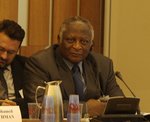Bernard MUNA
contribution 20 -
MUNA Bernard Acho

tags
RPF prosecutionoriginal version
I want just to start with a little remark, because I was also once the Deputy Prosecutor in charge, and I think when I hear the calling of Mr. Jallow, "You don’t do this, you don’t do that," I feel also concerned.
As a Prosecutor I worked within the means provided by me. As far as the FPR discussions, we had five. I called the procureur militaire. We worked on it. When Madam Arbia came, we went to see Mr. Kagame, and he agreed. But in the final analysis, in the atmosphere of the Rwandan Tribunal, the Prosecutor does not have an army in which he can go into Rwanda and do what he likes. And I think Madam Arbia raised this with the Security Council, and we know the United Nations was trying to protect the Rwandan government so that they could enhance peace. I think that these are factors which we are not taking into consideration. I think the fact of not prosecuting FPR is not the fault of the Prosecutor of the Tribunal. It is the question of the politics of those who created the Tribunal and those who founded the Tribunal.
I admire Professor Schabas because he has brought this matter to the ground. I admire idealists. I think we all want to be idealists, but in the final analysis we live on the ground, and what is practical is what we can do.
Just to cover one point which my friend Guichaoua said. When the genocide happened, there was already a ceasefire. There was no war. There was a ceasefire brought about by the Arusha Accords. So the genocide did not take place in an active fighting atmosphere. I think that the Judges were correct in the way that they looked at the genocide.
And then I think we have to really examine the question of the independence of the institution. Let me just make a word about that.
The ICC, I attended the conference of African lawyers in Youndé, and we were debating the ICC. I can tell you that in most of Africa the ICC is seen as a court to prosecute Africans. It is seen as a court that is near colonial, but does that mean that the fact that people committed offences and does it negate the fact that they committed offences? It doesn’t, but it is true that perception is an important thing. But at the same time it is recognised that those Africans who were prosecuted in The Hague did commit offences. They were found guilty. But the fact that only Africans are being prosecuted at the moment when we have wars in Iraq, in Iran, in Columbia, in Burma, in Sri Lanka where other atrocities are committed, does not mean to say that these people didn’t commit them, but it does not mean that the ICC is a failure. It is starting.
I just wanted to make that correction. Thank you.

